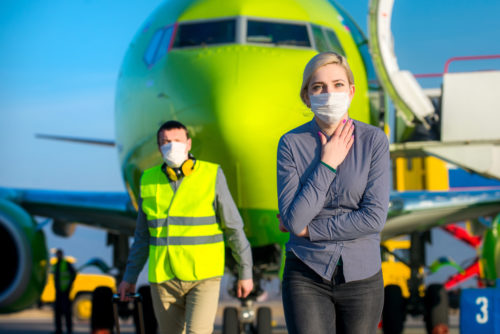The coronavirus has reached global levels of concern. As of March 4, 2020, the World Health Organization (WHO) reports that over 90,000 people are infected with the virus worldwide. These cases are present in most countries and continents, including South Korea, Italy, Iran, Japan, and the United States. The virus is what has many concerned about upcoming travel plans.
WHO is working to ensure that human-to-human transmission is limited and travel is one of the most obvious ways the virus spreads to other regions. While the general public is encouraged to avoid nonessential travel to specific regions, it doesn’t necessarily mean you need to cancel your summer vacation plans just yet. Learning more about potential travel restrictions and the best ways to travel during this time can help ensure you still enjoy your vacation if it’s safe to do so.
Table of Contents
Should I Cancel My Trip or Vacation Because of Coronavirus?
Deciding whether you should cancel your trip is dependent on several factors specific to your plan. Before you make a hasty decision and cancel your upcoming travel plans, consider your destination and the current outbreak status in the region. It’s important to understand the government agency’s regional travel regulations and how they relate to your health and destination.
If you’re planning a local trip that doesn’t involve public transportation and allows you to remain in your home country, you shouldn’t run into any travel restrictions. However, if you’re planning to travel abroad, researching your destination is crucial. Certain foreign destinations are more dangerous to travel to than others due to their outbreak status and the number of cases reported in the region. For all following destinations listed below, the information cited comes from the World Health Organization (WHO) provided situation report.
Australia
According to the WHO, Australia only has 25 confirmed cases of coronavirus. There are no travel restrictions for Australia but since the virus has already made its way to the country, it’s important to still take the proper precautions if you travel to this region. Wash your hands frequently and avoid contact with people who appear to be sick.
China
Both the WHO and the Centers for Disease Control (CDC) have set a Level 3 Travel Health Notice for China. Due to the widespread community transmission of the virus, these organizations are advising people not to visit the country for nonessential travel due to coronavirus dangers.
Chinese citizens are also not allowed to enter the United States for the time being. The Hubei region of China currently has the most confirmed cases of coronavirus at 66,907. The region has experienced 2,761 deaths due to the virus.
Germany
Germany has 57 total confirmed cases of coronavirus and no deaths associated with the virus. The CDC hasn’t placed any travel restrictions on Germany because the coronavirus doesn’t seem to be spreading rapidly in the region. However, if you travel to Germany and feel sick, seek treatment immediately.
Italy
The CDC reports widespread community transmission of the coronavirus in Italy. There are 1,128 confirmed cases of the virus and 240 new cases throughout the country. Italy has experienced 29 total deaths due to coronavirus and eight are newly reported deaths. Since the virus is spreading in the region, the CDC has set a Level 3 Travel Health Notice for Italy.
You should only travel to the region if it’s truly essential. If you’re elderly or have underlying health conditions, you may be at a greater risk of death or serious illness if you contract the virus. Avoid travel to Italy and any other countries currently under a travel health notice.
Iran
The CDC has suspended the entry of Iran citizens to the United States due to the widespread and ongoing transmission of the coronavirus in the region. Currently, a Level 3 Travel Advisory is in effect for Iran, so avoid all nonessential travel to the country. It has 593 confirmed coronavirus cases and 205 new cases. The country has already experienced 43 deaths, nine of which are new, due to the virus.
Japan
Japan is also experiencing ongoing community transmission of the coronavirus and the CDC has set a Level 2 Travel Health Notice regarding travel to the country. Older residents or those who have chronic medical conditions are advised to postpone their travel plans to Japan.
Tokyo is set to be the host city for the 2020 Summer Olympic Games. Since the event requires travel to the region and the gathering of crowds, there are discussions about safety and the coronavirus. If the virus continues to spread throughout the region, the games may be postponed or canceled.
The United States
The United States has 62 confirmed coronavirus cases. These cases are reported in:
- California;
- Washington;
- New York;
- Illinois;
- Florida;
- Oregon;
- Arizona;
- Georgia;
- Massachusetts;
- New Hampshire;
- North Carolina;
- Rhode Island;
- Wisconsin.
Although San Francisco has declared a state of emergency due to the virus, there are no travel restrictions within the United States.
South Korea
The CDC has also set South Korea at a Level 3 Travel Health Notice, so nonessential travel to the region should be avoided. There’s widespread virus transmission throughout South Korea and the entire Republic has reported 3,736 cases and 18 deaths.
Are Flights Safer Than Cruise Ships?
As long as you follow the CDC recommendations, you should be safe taking a flight or a cruise. Cruise ships that originated from risky regions or with passengers who are showing signs of illness may be quarantined. If the risk for the coronavirus is high, a cruise line may cancel cruises altogether.
Airlines are also taking precautionary steps to prevent the spread of the virus. Airline passengers coming from high-risk regions may have their temperature taken in the airport at random.
Are Amusement Parks Safe?
Amusement parks located in regions that are high-risk for the transmission of the coronavirus may be shut down. If you’re planning to visit a park in the U.S. or in another region that’s safe to travel to, continue practicing safe hand washing techniques and stay away from individuals who are sick.
What About Cancellation and Booking Policies?
If you had a trip planned to a region that’s considered high-risk for the coronavirus and you need to cancel, consider asking for a travel waiver. Some major airlines are offering customers who meet the qualifications a chance to recoup the money they lost on their trip. Cruise lines that cancel cruises also offer vouchers or refunds. Most hotel chains in affected areas are waiving change fees for customers.
Does Travelers Insurance Cover Coronavirus?
If you have travel insurance through your credit card company or bought a basic policy and want to cancel due to coronavirus, it may not be covered. Unless you bought a travel insurance policy that includes “cancel for any reason” coverage, you can only claim your canceled trip if you got sick while traveling.
How Do I Travel Safely If I Still Choose To Go?
If you still choose to travel, keep yourself protected from infection by:
- Washing your hands frequently and properly.
- Staying away from sick people.
- Quarantining yourself if you feel ill.
- Disinfecting surfaces you touch frequently, such as your phone and computer.
- Ensuring your coworkers are following guidelines to keep your workplace safe from the coronavirus.
The coronavirus can be transmitted from person to person, making travel risky. However, as long as you pay attention to the CDC recommendations and travel safely, you can enjoy your vacation while protecting yourself from the virus.
Image Source: https://depositphotos.com/





